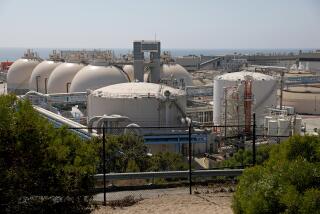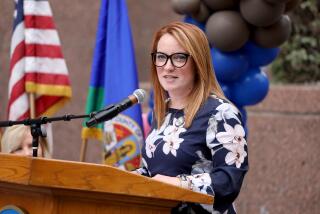Concessions Offered on Sewage Plant
THOUSAND OAKS â Offering a rare political compromise on the contentious plan to upgrade the cityâs aging sewer plant, two slow-growth City Council members Thursday agreed to support a modest expansion of the plant and to consider limited fee hikes to pay for the plan.
âThe idea here is just to give a little, hoping that the rest of the council will give a little, too,â said Councilwoman Linda Parks, who has opposed a proposed $75-million expansion plan. âWeâre taking steps toward the middle ground.â
Council newcomer Parks, and council ally Elois Zeanah who has consistently voted to block the expansion and fee hikes, proposed a seven-point compromise plan in an effort to break a sewer stalemate that has spanned a year and a half.
The proposed concessions, however, appear to be small, said Councilman Mike Markey.
âTo me this [proposal] represents probably a little, little step forward as far as admitting we have to raise rates,â Markey said. âA lot of these points have been brought up before.â
To comply with health and safety standards and to avoid multimillion-dollar fines, the Hill Canyon Sewage Treatment Plant must be upgraded and expanded. The contentious questions long have been: Does Thousand Oaks need to expand its sewer plant capacity by 40% and add amenities, including a conference room and a lunch area, as proposed by city officials? And should current city residents pay the upgrade tab?
The Hill Canyon facility, which was built in the 1960s, is operating at about 83% of its 10-million-gallon daily capacity, and state law dictates that the city ensure that the capacity is not exceeded. Much of the sewer equipment is outdated as well.
Under a 15-year expansion plan proposed by city public works officials, residents would pay about 30% of the cost and developers would cover the rest.
The councilâs slow-growth contingent--Zeanah, paired first with former Councilwoman Jaime Zukowski and now with Parks--has long argued that the cost should fall on developers alone and that the expansion is more lavish than is necessary.
âWeâre putting something specific on the table, and we have included compromises on capacity expansion and sewer rates,â Zeanah said. âWe hope that the other three council members will meet us and also compromise so we can reach a consensus.â
Specifically, the two councilwomen reluctantly said they would agree to expand the plant to a daily capacity of 11.6 million gallons, even though they think the current capacity can accommodate all future growth now permitted by the cityâs General Plan.
âThat is a major compromise on our part,â Zeanah said.
But their waste-water concession falls far shy of the 14-million-gallon daily capacity called for in the expansion plan.
Zeanah and Parks were less specific about how much they were willing to see current city residents pay for their part of the expansion. If fees are raised to pay for an upgrade, Parks said, the higher rates must end once the expansion is paid for.
âWhat this says to me is, yeah, they agree the plant needs to be expanded and it needs to be paid for,â Markey said. âThis doesnât solve the issue of how to pay for it.â
Because they did not receive copies of the compromise proposal until late Thursday, Markey and Mayor Judy Lazar declined to discuss specifics of the plan. The council will consider the proposal and other sewer plant expansion issues at a Feb. 18 study session.
âMy really quick impression is that itâs nice to finally see something in print,â Lazar said. âIt certainly gives us something to look at. I certainly will be looking at it.â
More to Read
Sign up for Essential California
The most important California stories and recommendations in your inbox every morning.
You may occasionally receive promotional content from the Los Angeles Times.










